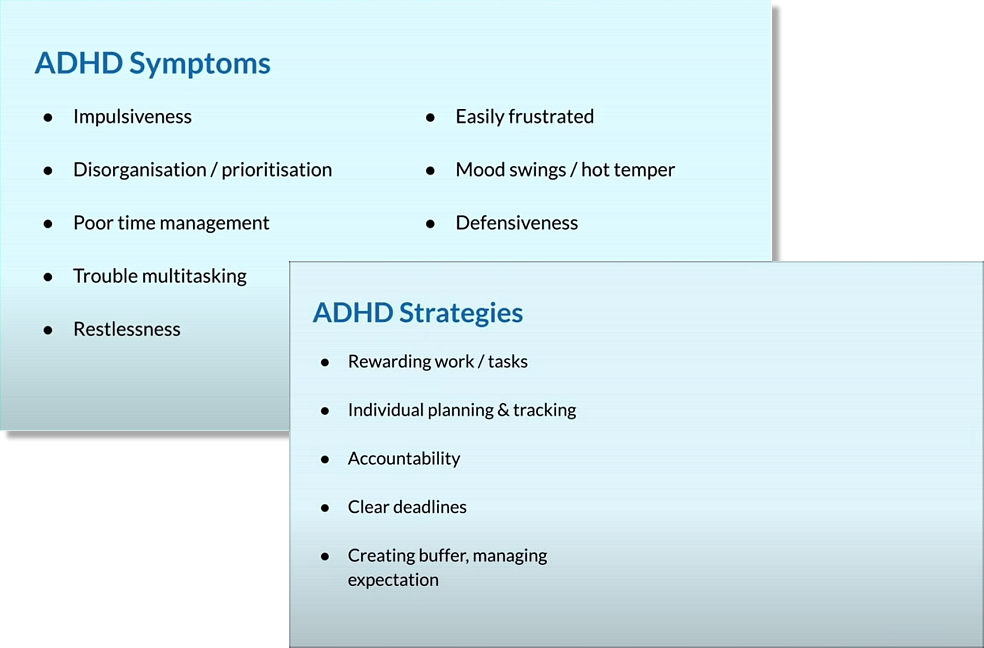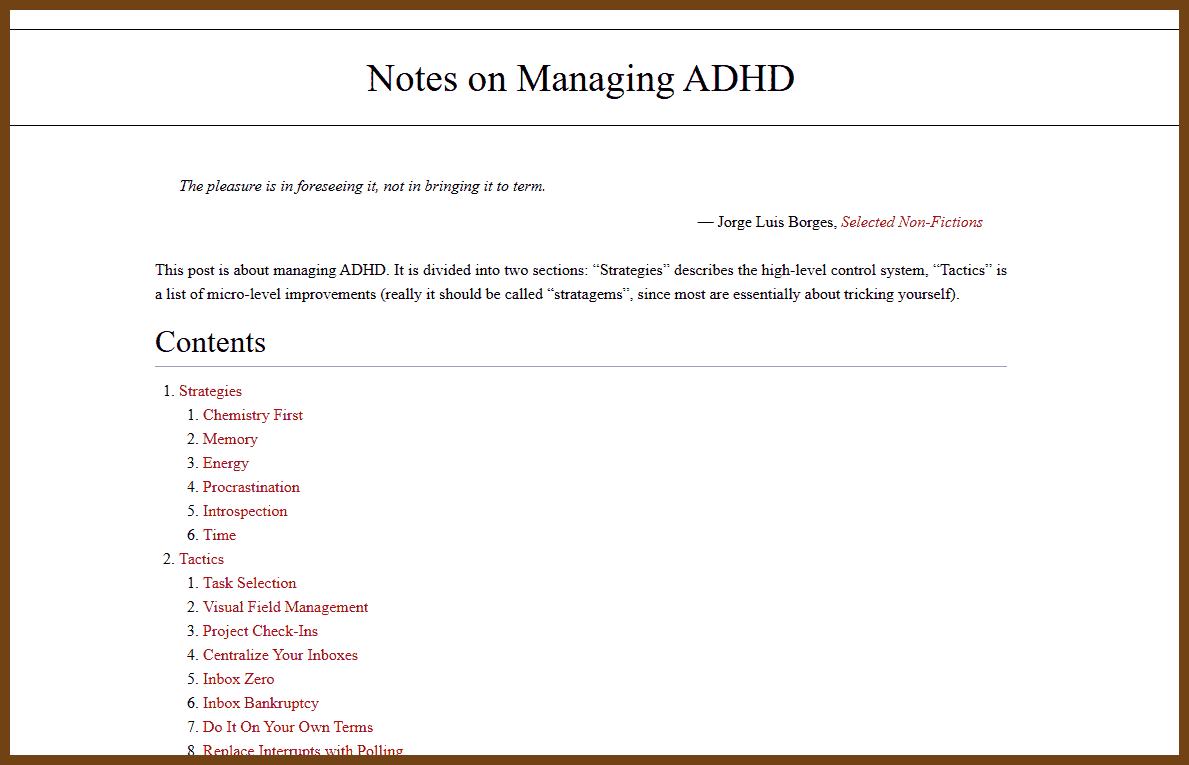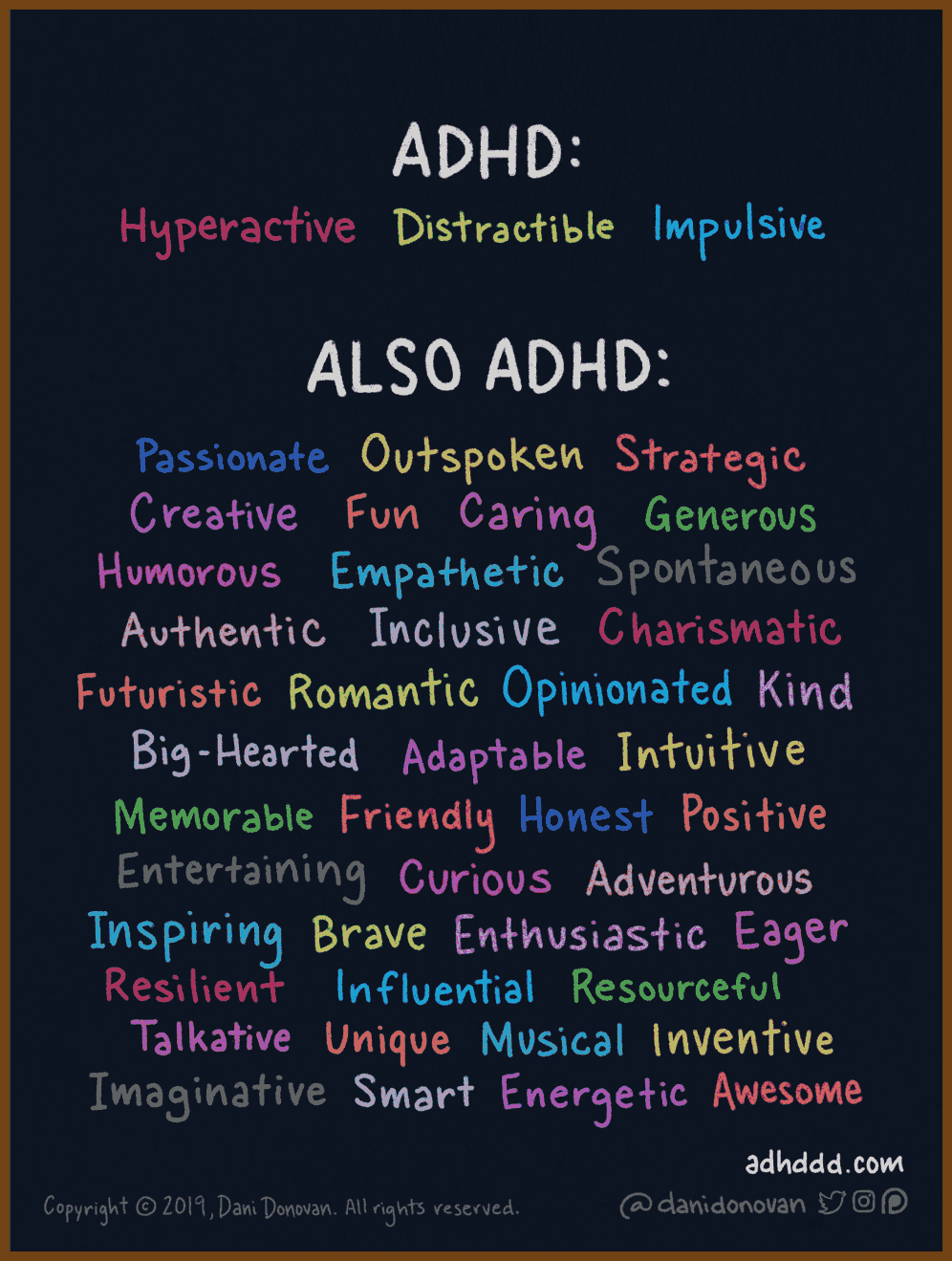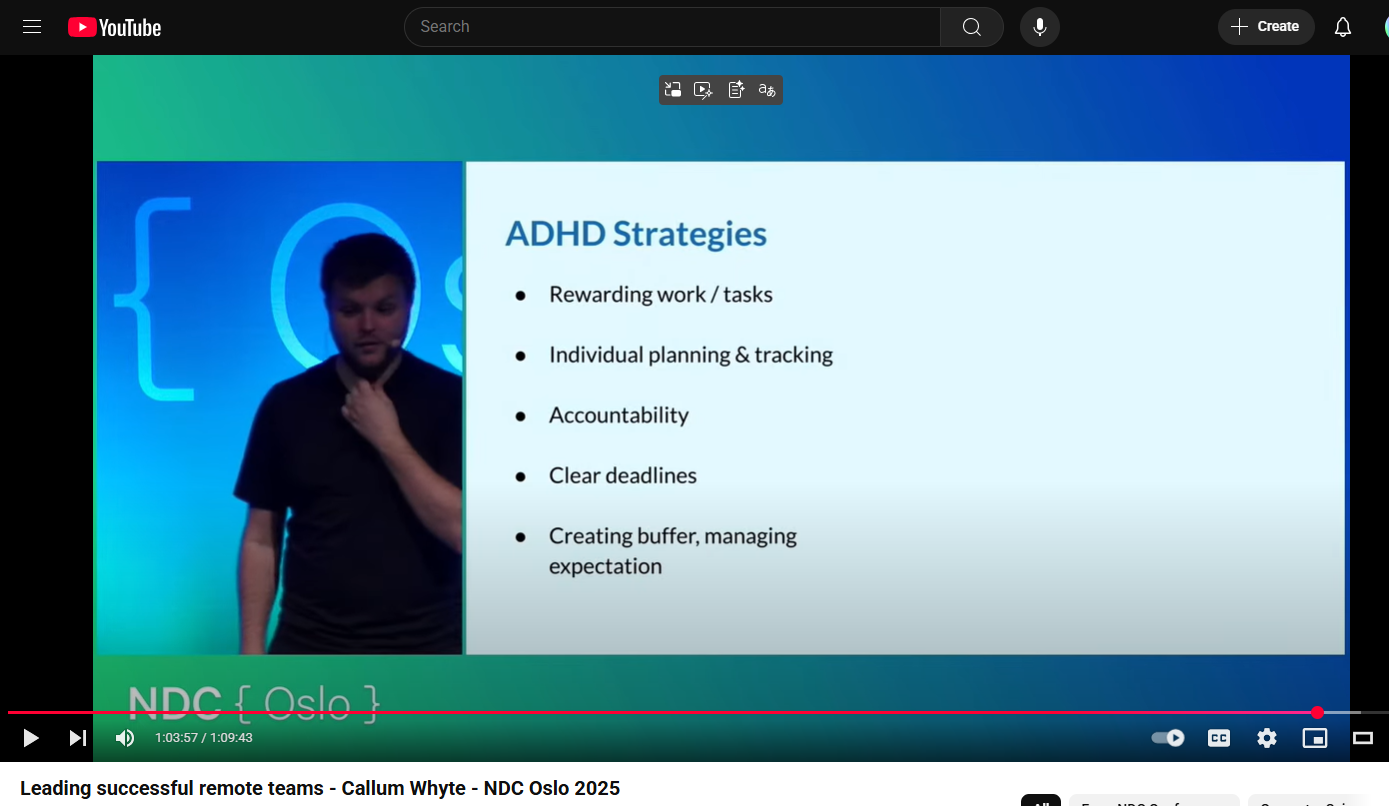Mental Health / ADHD
Date: 2023-05-21
Disclaimer 🧠
Please be aware that the information provided on this page is for informational purposes only and should not be used as a substitute for professional advice. While I have made every effort to present accurate and reliable information, you should understand that the information provided is subject to change and may not apply to all situations or individuals.
I do not guarantee or warrant the accuracy, completeness, or timeliness of the information contained on this page. The information provided is provided "as is" without any warranties of any kind, express or implied, including but not limited to the implied warranties of merchantability, fitness for a particular purpose, or non-infringement.
Reading, using, or relying on the information on this page is done at your own risk. I disclaim all responsibility and liability for any harm, loss, damage, or injury arising out of or in connection with your use of or reliance on the information provided on this page.
It is your responsibility to evaluate the accuracy, completeness, or usefulness of any information or any content available on this page. Please consult with a qualified healthcare professional for any medical or health-related advice.
2025-07-21 Leading successful remote teams - Callum Whyte - NDC Oslo 2025 - YouTube { www.youtube.com }

Blogs and Articles
2023-04-07 mrseth01/awesome-adhd: Awesome Resources for ADHD
2023-04-07 Show HN: ADHD-friendly Pomodoro web app | Hacker News
2023-04-24 Opening up about my ADHD. Diagnosed at 34, I hope my story can… | by Kyle Gordon | Medium
It would be a mistake to write a blog about ADHD without having a summary at the beginning. I know I would need one. So here it is :
I’ve always had focus issues but I misdiagnosed them as problems related to energy. Through school and career I found that the only reliable way for me to motivate myself was to generate stress and consume an unhealthy amount of caffeine. At first doing work just before it’s due, and later in life harnessing it in a more healthy manner by faking early deadlines. Late 2021 I got sick and I couldn’t drink caffeine anymore and stress caused me a good deal of pain. Thought my career was over, so I turned to my doctor and she sent me to be evaluated for ADHD and Bipolar. Turns out I have ADHD and the medication has given me a new lease on life. Please, if you relate to my story at all, pursue help.
2023-05-15 Taxonomy of procrastination
ADHD and procrastination
What I’d like to understand is: Is there a failure mode from having too much willpower?
There’s an angle on this that seems promising at first. People who have ADHD have “low willpower”. This is claimed to be a result of some kind of dopamine (or norepinephrine) dysfunction—either producing too little, or having low-sensitivity receptors. So is there a problem associated with having “too much” dopamine? Perhaps yes—the dopamine hypothesis is that an overly sensitive dopamine system (or taking lots of meth) causes schizophrenia.
As a cartoon, we might think that:
LOW DOPAMINE ↓ LOW CONFIDENCE IN PREDICTIONS ↓ FORGET HOMEWORK PLAY VIDEO GAMES
And:
HIGH DOPAMINE ↓ EXTREME CONFIDENCE IN PREDICTIONS ↓ HALLUCINATIONS
Nice theory, right? Trouble is, people with ADHD are also much more likely to develop schizophrenia. So this doesn’t make sense, nothing makes sense.
2025-08-31 Notes on Managing ADHD { borretti.me }

I build external scaffolding so my brain has fewer places to drop things: memory lives in a single todo list, and the one meta habit is to open it every morning; projects get their own entries so half-read books and half-built ideas do not evaporate; I keep the list pinned on the left third of the screen so it is always in my visual field. I manage energy like voltage: early morning is for the thing I dread, mid-day is for creative work, later is for chores; when I feel avoidance, I treat procrastination by type—do it scared for anxiety, ask a human to sit with me for accountability, and write to think when choice paralysis hits; timers manufacture urgency to start and, importantly, to stop so one project does not eat the day. I practice journaling across daily, weekly, monthly, yearly reviews to surface patterns and measure progress; for time, I keep a light calendar for social and gym blocks and add explicit travel time so I actually leave; the todo list holds the fine-grained work, the calendar holds the big rocks.
On the ground I favor task selection by shortest-first, with exceptions for anything old and for staying within the active project; I do project check-ins—even 15 minutes of reading the code or draft—to refresh caches so momentum is cheap; I centralize inboxes by sweeping mail, chats, downloads, and bookmarks into the list, run Inbox Zero so nothing camouflages, and declare bankruptcy once to reset a swampy backlog. I plan first, do later so mid-task derailments do not erase intent—walk the apartment, list every fix, then execute; I replace interrupts with polling by turning on DND and scheduling comms passes; I do it on my own terms by drafting scary emails in a text editor or mocking forms in a spreadsheet before pasting; I watch derailers like morning lifting, pacing, or music and design around them; I avoid becoming the master of drudgery who optimizes the system but ships nothing; when one task blocks everything, I curb thrashing by timeboxing it daily and moving other pieces forward; and I pick tools I like and stick to one, because one app is better than two and building my own is just artisan procrastination.
ADHD, productivity, todo list, journaling, energy management, procrastination, timers, inbox zero, task selection, planning, timeboxing, focus, tools
ADHD for Software Developers
Awesome (active 2024-12-28) reddit: https://www.reddit.com/r/ADHD_Programmers
2024-12-29 For those committed to this path: Any struggle with work/life balance? If you had to start all over, would you try for a different career or go the same route? : r/ADHD_Programmers {www.reddit.com}
Question:
For those committed to this path: Any struggle with work/life balance? If you had to start all over, would you try for a different career or go the same route? I understand programming with ADHD has it's own perks and challenges, but it's by no means a barrier to success.
Good answer (by coltrain423):
Work/Life balance comes down to the particular job - some companies suck, some rock. It’s easy for me to get hyper fixated on a problem and work late accidentally, but that’s just a thing I gotta work around.
The thing about programming as a career is that it’s not about knowing, it’s about learning.
At first you learn your tools: your programming language and programming in general, your IDE, and how “building software” differs from “writing code”. You’ll have to do this forever, because this industry is always evolving. It’s easier than it sounds though; if you know how to think about your solution and write it in one programming language, you can apply those same concepts to another language - you’re just learning a new tool instead of learning how to write code generally. It becomes second nature and just part of the job, especially if you foster curiosity.
After you’ve learned enough to do the job, the job will change with promotions and companies and projects and experience. No two projects are ever the same, so you’ll always have to learn some new process or tool or platform. That’s not as bad as it sounds either: the important part is the concepts behind everything. If you know how to use an asynchronous messaging pattern in a system, then learning how to use a particular messaging platform is a matter of reading docs to find the details; again, the “asynchronous messaging pattern in a system” is the important part, and the details will always vary.
Once you’ve learned how to use your tools to build a solution, you’re still not done. Every time you build a new feature, fix a new bug, or work on a new system, you’re just learning. You’re learning how to build Feature X. You’re learning how fix Bug B. The only time I don’t learn how to do something is if I’ve already written it somewhere else in the codebase, and then I learn how to reuse it instead. No two codebases are the same, so anytime you build anything you’re learning how to do it in the current context.
Programming, Software Development, Software Engineering, etc. aren’t about writing code. They aren’t about what you know, per se. They’re about learning how to solve problems, whether the problem is “it does something it shouldn’t”, “it doesn’t do something it should”, “our users would pay more if it could do this”, or even “it’s not fast enough” or “it’s too expensive to run”. After all, the only way you know how to solve the problem is to do it: until then, it’s just an educated guess.
You’ll have a much more satisfying career in software with less imposter syndrome if you embrace that early: don’t worry about what you don’t know because learning is the job.
I can’t imagine a better fit for my personal flavor of ADHD. I thrive on the novelty (learning all the time), creativity (solving problems), and immediate concrete feedback (tests pass or fail). The “flexibility” is huge too - I can dive into a juicy feature or tackle a gnarly bug on my good days, and I can tackle simpler stuff like documentation or smaller bugs on my bad brain days. Within reason anyway, you gotta get the work done but the nature of the work is that mundane stuff matters too.
Keeping up isn’t a problem because it happens by doing the job, and a break isn’t a huge deal because the whole point is learning anyway so it’s not really very different. The concepts are like riding a bike, and you’d have to learn the details for the next project even if you didn’t take a break because they’re all different. Frankly, coming back from a long break puts you in a better position than coming out of a 20 year operations and maintenance role for a legacy application that hadn’t been updated - you know that you don’t know the modern landscape, you don’t mistakenly “know” current best practices from 20 years ago.
Key Facts
Attention Deficit Hyperactivity Disorder, commonly known as ADHD, is a neurodevelopmental disorder that affects both children and adults. While symptoms often begin in childhood, many individuals carry these symptoms into adulthood. Here are some key facts about ADHD:
- Prevalence: According to the Centers for Disease Control and Prevention (CDC), as of 2016, approximately 6.1 million children in the United States had been diagnosed with ADHD. In adults, it's estimated that 2.5% of the global population has ADHD.
- Symptoms: ADHD is characterized by symptoms of inattention, hyperactivity, and impulsivity. Inattention can manifest as difficulties in maintaining focus, forgetfulness, and easily being sidetracked. Hyperactivity can look like constant movement, restlessness, or talking excessively. Impulsivity may involve interrupting others, struggling with patience, and making hasty decisions without thinking through the consequences.
- Subtypes: ADHD has three primary subtypes: predominantly inattentive presentation, predominantly hyperactive-impulsive presentation, and combined presentation. The symptoms can change over time, and an individual’s classification might shift.
- Diagnosis: ADHD is diagnosed using criteria established by the American Psychiatric Association in the Diagnostic and Statistical Manual of Mental Disorders (DSM-5). Diagnosis involves gathering information from multiple sources, including parents, teachers, and in the case of adults, from the individuals themselves.
- Treatment: ADHD treatment typically involves a combination of medication, psychoeducation, behavior therapy, and lifestyle changes. Stimulant medications are often effective in reducing ADHD symptoms, but each individual's response to medication varies. Non-stimulant medications are also available.
- Co-existing conditions: Many people with ADHD also have co-existing conditions, such as learning disabilities, anxiety disorder, depression, bipolar disorder, and oppositional defiant disorder.
- Impact: ADHD can significantly impact various areas of life, including academic performance, employment, and interpersonal relationships. However, with proper support and accommodations, individuals with ADHD can thrive.
- Strengths: Despite the challenges associated with ADHD, many individuals with this condition exhibit unique strengths, including creativity, problem-solving abilities, a high energy level, and the ability to hyperfocus on tasks they find interesting.
The understanding and treatment of ADHD have come a long way, but it’s crucial to continue fostering an environment of acceptance and support for those with ADHD. By understanding ADHD better, we can better accommodate those with the condition in the workplace and society at large.
Let's see who it affects:
- Around 11% of school-aged kids in the US and 7.2% worldwide.
- About 3.4% of adults.
- Interestingly, less than 75% of these cases keep showing symptoms into adulthood. More on this at chadd.org
But hey, these numbers are a bit confusing. Why? Because a bunch of ADHD cases never get spotted, which is a major issue. Here are a few interesting points:
- Len Adler, a big shot in ADHD research and a professor at New York University, thinks that at least 75% of adults with ADHD don't even know they have it.
- Adults with undiagnosed ADHD are more likely than others to have mood problems, feel really sad, and deal with anxiety.
- Edward Hallowell, a top ADHD expert (who also has ADHD), says adults with undiagnosed ADHD often struggle at work. They may get fired often, suddenly quit, or just not do as well as they could. This can lead to losing confidence, motivation, and happiness over time. They might just settle for less than what they could achieve if they were diagnosed and treated. Check out more here.
And here's a little extra: Women and people identified as female at birth who are neurodivergent are often missed when it comes to diagnosing ADHD. This is because doctors and mental health folks often overlook their symptoms. You can read more on this here.
ADHD symptoms come from difficulties with something called executive functioning skills. To get a better idea of what ADHD can look like in a person, take a peek at this comic by Dani Donovan.

ADHD and Procrastination
ADHD and procrastination often go hand in hand. The difficulty that individuals with ADHD have in managing and organizing time, also known as time blindness, can contribute to chronic procrastination. Here are some key insights about ADHD and procrastination:
The Role of Executive Functions: ADHD is associated with impairments in executive functions – cognitive processes that help us plan, focus attention, remember instructions, and manage multiple tasks. Impairments in these areas can lead to procrastination, as tasks may feel overwhelming or individuals may struggle to prioritize and sequence tasks effectively.
Emotion Regulation and Procrastination: Emotion regulation difficulties are common in ADHD and can also contribute to procrastination. Individuals with ADHD might delay starting tasks that seem boring, frustrating, or anxiety-provoking.
Task Initiation: People with ADHD often struggle with task initiation – the ability to start a new task. This difficulty can manifest as procrastination, especially when tasks require a high level of effort or are perceived as boring.
Strategies to Address Procrastination: Certain strategies can be particularly helpful for individuals with ADHD who struggle with procrastination. These can include:
breaking tasks down into smaller steps
using visual organizational tools
practicing mindfulness to increase present-moment awareness
seeking external accountability (such as working with an ADHD coach or using a study group).
Role of Medication: ADHD medications can often improve executive functioning and attention, which may reduce procrastination. However, it's important to note that medication alone is often not a complete solution, and works best when combined with behavioral strategies.
Remember, every individual with ADHD is unique, and what works for one person might not work for another. It's important to work with a healthcare provider or an ADHD coach to develop an individualized plan.
How to Build an ADHD-Friendly Workplace
ADDitude magazine says that folks with ADHD need a few things to be at their best: incentives, positive vibes, and clear deadlines. Here are some tips they suggest:
Expect tasks to take longer than you might think. And by longer, we mean way longer.
Build in time for transitions during your day.
Break big tasks into bite-sized pieces.
Jot everything down. Yes, even those random thoughts that pop into your head.
Perfection is a trap. Don't fall for it.
Create a workspace that helps you focus, whatever that looks like for you.
Have everything you need for work close at hand.
Kick things off with the fun stuff. It'll help you get in the groove for the rest of your work.
Make deadlines impossible to ignore.
Try focusing on what you want to do instead of what you don't want to do. Your brain isn't great at understanding negatives.
Remember, these hacks work best when they fit you. So keep track of what works for you. A couple of good resources are The How Skills coaching and Jessica McCabe’s Motivation Bridge videos: Video 1 & Video 2
And hey, don't forget that ADHD is a mixed bag. There's good stuff and tough stuff.
There are lots of great things about ADHD, like the creativity, empathy, grit, and talents it brings. People with ADHD have unique strengths that can turn ADHD into a plus, not a minus:
Problem Solving: The way your thoughts bounce around can help you come up with solutions others might miss.
Imagination & Creativity: People with ADHD don't just think outside the box. We build our own castles with our endless imagination.
Love for Life: People with ADHD know how to find the silver lining and enjoy life, even when things are tough.
Acceptance: Living with ADHD can make us more accepting of differences in ourselves and others.
Compassion: Being different makes people with ADHD understand others who are different. We always root for the underdog.
Perseverance: Kids and adults with ADHD often have to work twice as hard. But that struggle can build a strong will to keep trying until you succeed.
Observation Skills: ADHD doesn't always mean you can't pay attention. Sometimes it means you notice everything, including things others overlook.
Laser-Focus: When people with ADHD get in the zone, they can get a lot done really fast.
But, ADHD can also make things really hard. It's been linked to:
- Struggling at school or work
- Unemployment
- Drinking or using drugs too much
- Getting into car accidents or other accidents
- Rocky relationships
- Bad physical and mental health
- Low self-esteem
- Money problems
- Run-ins with the law
- Suicide attempts
Other conditions that can make ADHD even harder to deal with often show up too. These include:
Other mental health conditions: Adults with ADHD are more likely to also have conditions like personality disorders, intermittent explosive disorder, and substance use disorders.
Learning disabilities: Adults with ADHD might not do as well on academic tests as you'd expect for their age, intelligence, and education. These disabilities can include problems with understanding and communicating.
Mood disorders: Many adults with ADHD also have depression, bipolar disorder, or another mood disorder. While these aren't caused by ADHD, the repeated disappointments and difficulties that come with ADHD can make mood problems worse.
Anxiety disorders: These are common in adults with ADHD. Anxiety can make you worry, feel nervous, and have other symptoms. The challenges and setbacks that ADHD brings can add to this anxiety.
You can read more about these challenges here.
So there you have it. ADHD can be tough, but it also comes with its own special strengths. And by creating a work environment that understands and supports people with ADHD, we can all do our best work together.
Key Areas to Provide Support and Allyship
- Recognize the impact of ableism and avoid positioning neurotypical individuals as the "norm". Jessica McCabe puts it well, describing ADHD as not a "failed version of normal".
- Invest in learning how ADHD brains function – your presence here is an excellent start! Understanding the strengths and weaknesses of an ADHD brain can prevent misconceptions that mistakes are due to a lack of care or effort.
- Embrace the differences in how brains operate and provide positive reinforcement for things ADHD brains excel at. For people with ADHD, positive reinforcement is a much stronger motivator than negative reinforcement or criticism, which can cause undue harm.
You can delve further into these topics in A New Day for Neurodivergence , Jessica McCabe's TED Talk on living with ADHD , Dr. Hallowell's Reframing ADHD , and Avoiding Failure-Punishment in Children with ADHD .
Suggested Resources
- Opening up about my ADHD
- Jessica McCabe shares her personal story in Failing at Normal: An ADHD Success Story .
- Dr. Thomas E. Brown provides an insightful overview in ADD/ADHD | What Is Attention Deficit Hyperactivity Disorder? , discussing ADHD diagnosis, symptoms, treatment options, and medication.
- The Attention Deficit Disorder Association provides resources and networking opportunities to help adults with ADHD lead better lives.
- CHADD offers information, support, and advocacy for families and individuals with ADHD.
- ADDitute Magazine is an online resource providing expert guidance for living better with ADHD and related mental health conditions.
- Totallyadd.org offers expert information about ADHD in adults.
- The "Faster Than Normal" podcast features ADHD-friendly 20-minute interviews with successful people from diverse walks of life who've leveraged their ADHD to their advantage.
- The ADHD reWired Podcast with Eric Tivers offers free insights, stories, and strategies on time-management, executive functioning, emotions, and more for adults with ADHD.
Fun interruption
2024-01-18 ADHD - "Under The Sea" Parody - YouTube 2024-01-19 ADHD Needs A New Name - Supercalifragilisticexpialidocious Parody - YouTube
